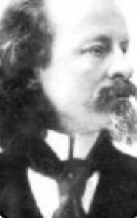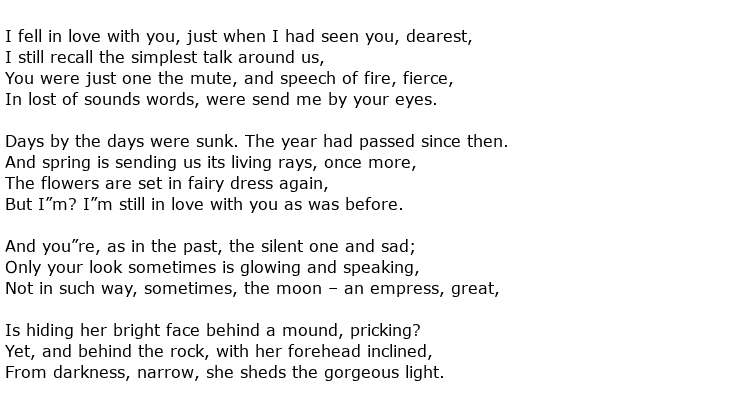 Konstantin Balmont was a Russian poet of the Symbolist school who wrote during his country’s “Silver Age” of poetry, an era that had a similar impact on society as the “Golden Age” which had occurred a hundred years previously. He was also a translator and literary critic.
Konstantin Balmont was a Russian poet of the Symbolist school who wrote during his country’s “Silver Age” of poetry, an era that had a similar impact on society as the “Golden Age” which had occurred a hundred years previously. He was also a translator and literary critic.
He was born Konstantin Dmitriyevich Balmont on the 15th June 1867 in a small village called Gumnishchi, which can be found close to the city of Vladimir. He was fortunate to be part of a noble family and he was educated, initially, by his multi-lingual mother before going on to attend two gymnasium faculties. At the age of 17 his revolutionary activities found him at odds with the school authorities and he was expelled. He was able to take up his studies again later and then went to Moscow University to study they law. He was, however, unwilling (or unable) to change his views on the way politics were shaping up and he left in 1889 without completing the course. His favoured course was, instead, to become a writer.
Balmont was soon developing a deeply philosophical approach to life but it was not without incident. He had been writing poetry since the age of nine without making a success of it and he undertook an ill-fated marriage at the age of 21 which lasted for five years, marrying again when he was 28. Many of his friends had committed suicide and he attempted it himself, only succeeding in breaking a number of bones in his body which left him physically disabled and mentally scarred for life. After being rebuffed by publishing houses he decided to publish his own work in 1890 but it was a total failure, leading to him destroying most of the printed copies.
He tried his hand at translating instead which was not difficult as he had followed his mother’s lead in learning a number of languages. The works of Ibsen, Poe and Whitman, amongst others, plus work by Georgian and Armenian poets were translated and then, in 1893, he completed the major task of translating all of Percy Bysshe Shelley’s works into Russian. He was encouraged by the success of these projects and sat down once more to write his own poetry. Under Northern Skies was published in 1894 and then Silence came out four years later.
He was finally an established Russian poet, following the Symbolist discipline, and his work demonstrated his acute skill in making fine observations of the world and turning them into verse. Further volumes appeared; Let Us Be Like the Sun and Love Alone, both in 1903, are seen as some of the best examples of his poetry. His work was sometimes optimistic, occasionally mournful and often romantic and he endeavoured to transform Russian literature into something more hopeful. A good example of his work is the poem Beatrice, a piece that clearly shows the author’s obsession with this woman’s charms, although his feelings do not appear to be reciprocated. It is reproduced below:

Later work had a harder edge and one poem, Little Sultan, appeared to contain criticism of the Tsar and, for this, the authorities exiled him from St Petersburg. He simply took the opportunity to travel and he had the means to visit countries around the world. Although he was welcomed back to Russia in 1913 he did not feel inclined to stay after the Bolshevik Revolution of 1917 and left the country, never to return, in 1920.
Konstantin Balmont died in France on the 23rd December 1942 at the age of 75. His literary output ran to over fifty books, many of which were written in his later years of exile in Paris, although the general view of the critics is that his best work was done in his early years.

